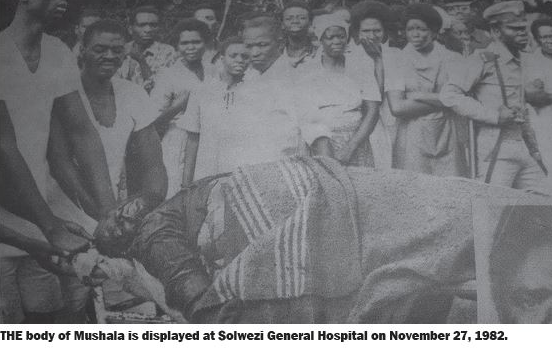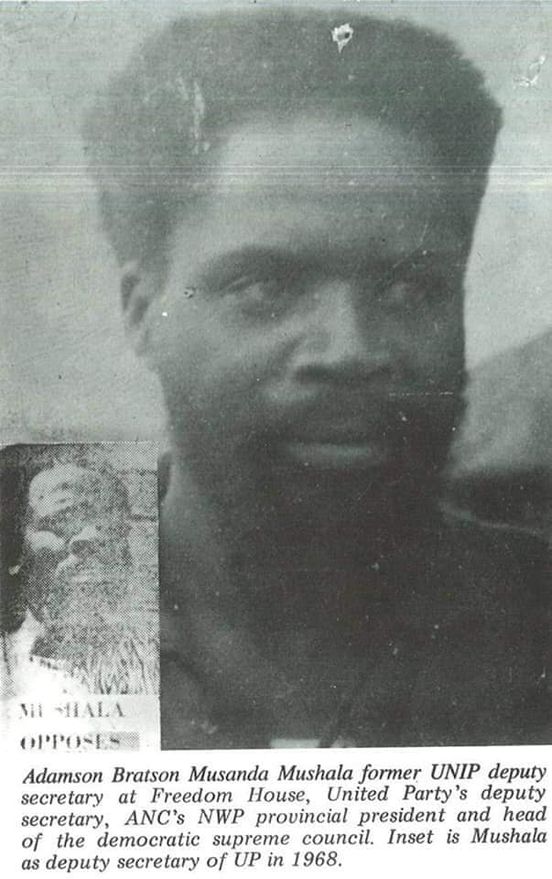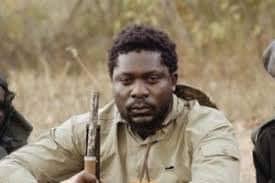Adamson Bratson Mushala was killed late in 1982 in a military ambush near Solwezi, in the remote reaches of Northwestern Province, where his bizarre story began with a post-independence dispute in the 1960's and ended with a bullet through the eye.
His death culminated a protracted, if low-key, army campaign whose failures had become as much a part of the national fabric as had the mythology surrounding the man.
At his death, the official report said, Mushala was carrying wild honey and therefore had trouble reaching for his rifle to return the army's fire.
So great was official concern that no one would believe that the rebel had finally been slain that the state-run television devoted prime-time viewing one night to lurid close-ups of his cadaver. 

On the day after a soldier put a bullet through Adamson Mushala’s eye on November 26, 1982, a newspaper proclaimed his death with a screaming headline – ‘Army kills public enemy No. 1’
So how did a promising politician transform into a rebel?
One day in December 1972, Adamson Mushala bundled his wife and five children, including a two-weeks-old baby, into a brand new Land Rover 109 station wagon and drove off from his home in Mufumbwe.
He had told his wife that they were going to attend a friend’s wedding in Mongu, Western Province, but they soon found themselves crossing the border into Angola.
That was Mushala’s escape out of the country to begin his armed rebellion against the Kaunda government that would last from 1976 to 1982.
The facts are that Mushala was sent for military training because the thought was that we would have to engage the British militarily, but when he came back in 1963, it was clear that we would get independence by negotiation and that there would be no need for guerrilla warfare
After independence, Mushala was transferred to Freedom House from North- Western Province, where he had been working as a constituency official.
However he thought he was being side-lined by the party leadership, that matters that were supposed to pass through his hands were not coming to him.
He felt there was no room for him in Freedom House and he wanted to leave. Months later, Mushala decided to go back to Mufumbwe, where he tried to venture into business. Mushala obtained a loan from the government and bought two trucks, boats and fishing nets.
But in June 1966, before Mushala’s business could take off, a new political party called the United Party (UP) was formed, led by Mufwaya Mumbuna.
For Mushala, it was a beckoning call back to the capital and into the political melee of post-independence era. Mushala was deputy secretary general of UP.
But on August 13, 1968, following bloody clashes between UP and UNIP members in Chililabombwe on the Copperbelt, President Kaunda banned the opposition party. Seven members including Mushala of UP were arrested and sent into restriction. He was later released.
His rebellion was fired by the increasingly manifest failure of the independent Zambian state to fulfil its people’s expectations of national social and economic development and the declaration of a one-party state was the last straw for him
He and his supporters consistently acted and saw themselves as the spokesmen of the neglected peoples of the North-Western Province.
Mushala’s struggle within Zambia, from 1976 to 1982, was fought largely without external support. The insurgency was thus more notable for its political impact than its military significance.
Mushala’s ragged band of fighters, inspired simultaneously by anti-Communism, post-colonial economic discontent and the power of magic, were heroes who resisted the one-party state and, in so doing, paved the way for the pro-democracy movement of 1990-91.
Mushala’s programme cannot be summarised into a single coherent agenda for political change. Indeed, the rebellion’s capacity to deliver a range of widely different messages to potential supporters was, like other rural movements, a significant part of its mobilising power.
Mushala did, however, produce a “Plan of Action” that amounted to an alternative vision for the organisation and governance of independent Zambia.94 The “Plan” proposed to replace UNIP’s government with a federal multi-party democracy – the “United States of Zambia” (USZ). 

Accusations of tacit or open support for his activities also became more common. Despite the restriction of his operations primarily to the North-Western Province, Mushala’s frame of reference remained both national and regional.
There is a lot more to the Adamson Mushala story which I am unable to put into this thread but you can decide for yourself if he was a hero or villan
Source: Zambia Daily Mail, Zambian Observer, Facebook - Kalemba
There is a Zambian movie released in 2019 about his life. If anyone knows the title and where it can be found, kindly share the details 

• • •
Missing some Tweet in this thread? You can try to
force a refresh













